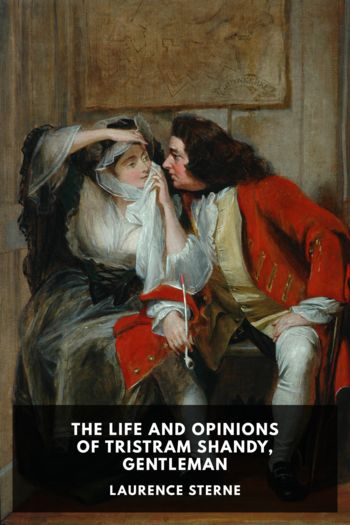The Life and Opinions of Tristram Shandy, Gentleman, Laurence Sterne [rosie project txt] 📗

- Author: Laurence Sterne
Book online «The Life and Opinions of Tristram Shandy, Gentleman, Laurence Sterne [rosie project txt] 📗». Author Laurence Sterne
King William, said my uncle Toby, addressing himself to Yorick, was so terribly provoked at count Solmes for disobeying his orders, that he would not suffer him to come into his presence for many months after.⸺I fear, answered Yorick, the squire will be as much provoked at the corporal, as the King at the count.⸺But ’twould be singularly hard in this case, continued he, if corporal Trim, who has behaved so diametrically opposite to count Solmes, should have the fate to be rewarded with the same disgrace:⸺too oft in this world, do things take that train.⸺I would spring a mine, cried my uncle Toby, rising up,⸺and blow up my fortifications, and my house with them, and we would perish under their ruins, ere I would stand by and see it.⸺Trim directed a slight,⸺but a grateful bow towards his master,⸺and so the chapter ends.
XXIII⸺Then, Yorick, replied my uncle Toby, you and I will lead the way abreast,⸺and do you, corporal, follow a few paces behind us.⸺And Susannah, an’ please your honour, said Trim, shall be put in the rear.⸺’Twas an excellent disposition,—and in this order, without either drums beating, or colours flying, they marched slowly from my uncle Toby’s house to Shandy-hall.
⸺I wish, said Trim, as they entered the door,—instead of the sash weights, I had cut off the church spout, as I once thought to have done.—You have cut off spouts enow, replied Yorick.⸺
XXIVAs many pictures as have been given of my father, how like him soever in different airs and attitudes,—not one, or all of them, can ever help the reader to any kind of preconception of how my father would think, speak, or act, upon any untried occasion or occurrence of life.—There was that infinitude of oddities in him, and of chances along with it, by which handle he would take a thing,—it baffled, Sir, all calculations.⸺The truth was, his road lay so very far on one side, from that wherein most men travelled,—that every object before him presented a face and section of itself to his eye, altogether different from the plan and elevation of it seen by the rest of mankind.—In other words, ’twas a different object, and in course was differently considered:
This is the true reason, that my dear Jenny and I, as well as all the world besides us, have such eternal squabbles about nothing.—She looks at her outside,—I, at her in—. How is it possible we should agree about her value?
XXV’Tis a point settled,—and I mention it for the comfort of Confucius,22 who is apt to get entangled in telling a plain story—that provided he keeps along the line of his story,—he may go backwards and forwards as he will,—’tis still held to be no digression.
This being premised, I take the benefit of the act of going backwards myself.
XXVIFifty thousand pannier loads of devils—(not of the Archbishop of Benevento’s,—I mean of Rabelais’s devils) with their tails chopped off by their rumps, could not have made so diabolical a scream of it, as I did—when the accident befel me: it summoned up my mother instantly into the nursery,—so that Susannah had but just time to make her escape down the back stairs, as my mother came up the fore.
Now, though I was old enough to have told the story myself,—and young enough, I hope, to have done it without malignity; yet Susannah, in passing by the kitchen, for fear of accidents, had left it in shorthand with the cook—the cook had told it with a commentary to Jonathan, and Jonathan to Obadiah; so that by the time my father had rung the bell half a dozen times, to know what was the matter above,—was Obadiah enabled to give him a particular account of it, just as it had happened.—I thought as much, said my father, tucking up his nightgown;—and so walked upstairs.
One would imagine from this⸺(though for my own part I somewhat question it)—that my father, before that time, had actually wrote that remarkable character in the Tristra-pædia, which to me is the most original and entertaining one in the whole book;—and that is the chapter upon sash-windows, with a bitter Philippick at the end of it, upon the forgetfulness of chambermaids.—I have but two reasons for thinking otherwise.
First, Had the matter been taken into consideration, before the event happened, my father certainly would have nailed up the sash window for good an’ all;—which, considering with what difficulty he composed books,—he might have done with ten times less trouble, than he could have wrote the chapter: this argument I foresee holds good against his writing a chapter, even after the event; but ’tis obviated under the second reason, which I have the honour to offer to





Comments (0)